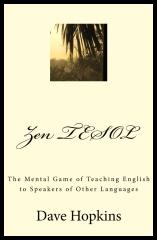
Are We
Arrogant?
by Dave
Hopkins
Diversity
Showdown
by Robb
Scott
What Makes
Groups Click?
by Robb
Scott
![]()
/Index/
/Letters/
/Profiles/
/Search/
/Podcasts/
![]()
Subscribe
for free!

The Arrogance of Teaching:
Notes From the Field
By Dave Hopkins
After many years of teaching, teacher education, and reading hundreds teaching journals, I am amazed at the arrogance of teachers who are completely convinced of their own invincibility as communicators of knowledge, readers of minds and knowers of the abilities of others. I do not mean to disparage teachers who make optimistic statements about what their students are learning or thinking, but I want to raise the question of how much we really know.
"We know that teaching does not cause learning, but we must act as if it does" (Larsen-Freeman, 2003). Unfortunately, when we act and think as if we are the causal element in the learning process, we begin to imagine that what we teach is what has been learned. This may or may not be true, but it doesn't take much reflection upon our own learning experience to remember that what the teacher was teaching was not necessarily what we learned. As a matter of fact, I would question how much of the time the learner actually knows what the teacher is teaching.
I recall one training course where we were discussing assessment when a participant raised their hand and asked, "You mean all we have is circumstantial evidence of learning?" That's about it. Until there is a new "ap" that will read minds and tell us what is happening inside the minds of others, we are stuck with clues that may or may not indicate learning.
I am tempted by the old joke about the prime minister of an Asian nation who had practiced a greeting in English for a major economic meeting. Upon the occasion of the photo op for the press the PM leaned over to the American president and said, "Who are you?" The American president replied, "I am Hillary Clinton's husband." The PM replied, "So am I." The point of this little story is that the English is actually correct, but contextually wrong. Thus, when the student answers correctly in the classroom: a) have they learned, b) are they mimicking, or c) are they just lucky to have chosen the right words?
Equally misleading is the response that seems "wrong."
What do you go yesterday?
It would seem that the student has made some errors here, but if you look more closely you will see that most of the "grammar is correct.
The learner has chosen the wrong WH question word, and failed to put the DO into the past DID form. Not a bad score though since the correct elements are critical to English grammar. My point being, the teacher's assessment of what the student has learned is prejudiced by the teacher's own proficiency in the language.
Editor's note: Many thanks to my friend Dave Hopkins for these notes from a new project. He currently divides his time between training of trainers in Saudi Arabia and writing in Thailand.
Photo of Dave Hopkins at home in Thailand
2014 ESL MiniConference Online

Article by David B. Hopkins
davehbanphe@gmail.com
Riyadh, SAUDI ARABIA
Banphe, THAILAND